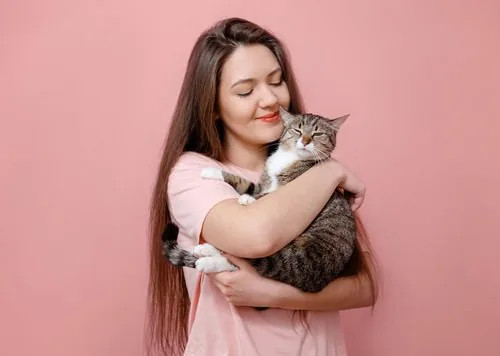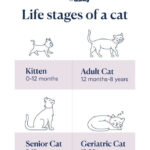It’s natural to be concerned if you notice unusual traits in your cat, especially if they remind you of conditions you know in humans. If you’ve wondered, “Could my cat have Down syndrome?”, you’re not alone. While the term “Down syndrome” is specific to humans, cats can experience genetic and neurological conditions that may present some similar characteristics. Let’s delve into the world of feline health to understand what might be behind those unique quirks you observe in your feline companion and explore the realities of what is often referred to as “Down Syndrome Cat”.
 young-woman-holding-cat-in-her-arms
young-woman-holding-cat-in-her-arms
The Genetic Differences: Why Cats Can’t Have Down Syndrome
Down syndrome in humans is a genetic disorder caused by an extra copy of chromosome 21. This extra chromosome leads to a range of physical and intellectual differences. However, the fundamental genetic makeup of cats is different from humans. Humans have 23 pairs of chromosomes, while cats have only 19 pairs. Crucially, cats do not possess a chromosome that corresponds directly to human chromosome 21.
Therefore, in the scientifically precise definition of the condition as it exists in humans, cats cannot have Down syndrome. The genetic mechanism simply doesn’t exist in feline biology.
Decoding “Down Syndrome-Like” Traits in Cats
Despite the genetic impossibility of Down syndrome in cats, some cats do exhibit traits that might superficially resemble those seen in humans with Down syndrome. These traits can include:
- Distinctive facial features: Such as a broad face, flattened nose, or widely spaced eyes.
- Developmental delays: Appearing slower to reach developmental milestones like walking, coordination, or learning.
- Behavioral variations: Showing unusual behaviors or cognitive differences.
It’s essential to understand that these “Down syndrome-like” traits in cats are not due to Down syndrome itself. Instead, they are symptoms of various other underlying health issues, including genetic abnormalities, congenital disabilities, or even environmental factors encountered during development.
What Causes Down Syndrome-Like Symptoms in Felines?
When a cat presents with symptoms reminiscent of Down syndrome, it’s crucial to investigate the actual causes. Several factors can lead to these symptoms:
- Feline Genetic Mutations: Cats, just like any living being, can experience spontaneous genetic mutations. These mutations can be unique to cats and are unrelated to human Down syndrome. They can manifest in physical or behavioral differences that might be misinterpreted as Down syndrome.
- Congenital Conditions in Cats: Congenital defects are birth defects that occur as a kitten develops in the womb. These can arise from various factors and can result in a spectrum of physical and neurological challenges. Examples include skull malformations, cognitive impairments, and other developmental difficulties.
- Infections During Feline Pregnancy: If a pregnant cat contracts certain infections, these infections can cross the placenta and impact the developing kittens. This can lead to developmental abnormalities that might present symptoms similar to what some might call “down syndrome cat” traits.
- Exposure to Toxins: Exposure to toxins during pregnancy or in early kittenhood can also disrupt normal development. Environmental toxins can contribute to physical deformities and neurological problems in kittens, leading to symptoms that are superficially similar to Down syndrome in humans.
It’s vital to reiterate that while these conditions can cause symptoms that might seem similar to Down syndrome, they are fundamentally different medical issues. Accurate diagnosis is crucial because the underlying causes dictate the appropriate care and management strategies for the cat.
Recognizing Potential Genetic and Congenital Issues in Your Cat
Identifying if your cat has an underlying genetic or congenital condition requires careful observation of both physical and behavioral characteristics. Keep an eye out for the following signs:
- Unusual Facial Features: Note any facial abnormalities such as a flattened or upturned nose, widely set eyes, or a noticeably small jaw. While these facial traits are sometimes mistakenly associated with Down syndrome in cats, they typically stem from other genetic or developmental issues.
- Delayed Development Milestones: Observe if your kitten seems slower than average in reaching developmental milestones. This might include delays in motor skill development, such as clumsiness or difficulty coordinating movements. Cognitive delays may manifest as slower learning in areas like litter box training, playing with toys, or social interaction.
- Behavioral Differences and Neurological Signs: Pay attention to any unusual behaviors, which could be indicative of neurological issues. This might include repetitive behaviors, coordination problems, reduced responsiveness to stimuli, or seeming disoriented. These behaviors are signs of potential neurological or genetic conditions, not feline Down syndrome.
When to Seek Veterinary Advice
If you observe any of these symptoms in your cat, it’s essential to consult with a veterinarian. A veterinary professional is the best resource to accurately assess your cat’s condition. They can perform a comprehensive physical examination and may recommend further diagnostic tests, including genetic testing in some cases, to pinpoint the underlying cause of the symptoms. Early diagnosis is key to providing the best possible care and support for your cat.
Providing Care for Cats with Special Needs
Cats with genetic or congenital conditions may require additional care and attention to ensure they live comfortable and fulfilling lives. Here are some key aspects of care:
- Regular Veterinary Check-ups: Consistent wellness examinations are crucial for managing any ongoing health concerns and for early detection of new issues. Your veterinarian can provide tailored advice based on your cat’s specific needs and health status.
- Tailored Diet and Environment: Some cats with developmental delays or physical limitations may thrive with a specialized diet or a modified home environment. For example, providing easily accessible food and water bowls and litter boxes is beneficial for cats with mobility issues. Ramps or steps can also aid in navigating the home.
- Enrichment and Social Interaction: Engaging your cat in regular play and social interaction is vital for their overall well-being and development, especially if they have cognitive or behavioral differences. Enrichment activities stimulate their minds and help them adapt to their surroundings, promoting a higher quality of life.
Creating a Supportive Home for a Special Needs Cat
Building a supportive home environment for a cat with special needs involves thoughtful adjustments to accommodate their unique requirements. Consider these tips:
- Safe and Secure Retreats: Ensure your home provides quiet, safe spaces where your cat can retreat and feel secure. These areas should be away from busy areas of the house and equipped with comfortable bedding to promote relaxation and reduce stress.
- Accessible Resources: Place essential resources like food, water, and litter boxes in easily accessible locations. For cats with mobility challenges, consider using shallow litter boxes and raising food and water bowls to a comfortable height. Ramps or steps can help them reach elevated areas they enjoy.
- Gentle Handling and Interaction: Be mindful of how you handle your cat, particularly if they have physical sensitivities or deformities. Use slow, gentle movements and avoid sudden noises or actions that could startle them. A calm and predictable environment is essential.
Cats with unique needs, whether due to genetic, congenital, or environmental factors, thrive with compassionate and informed care. With the right support and understanding, these special felines can live happy, enriched lives and bring immense joy to their loving owners. If you have any concerns about your cat’s health or suspect they might have a condition presenting “Down syndrome cat” like symptoms, please consult with your veterinarian to ensure they receive the appropriate care and attention.

